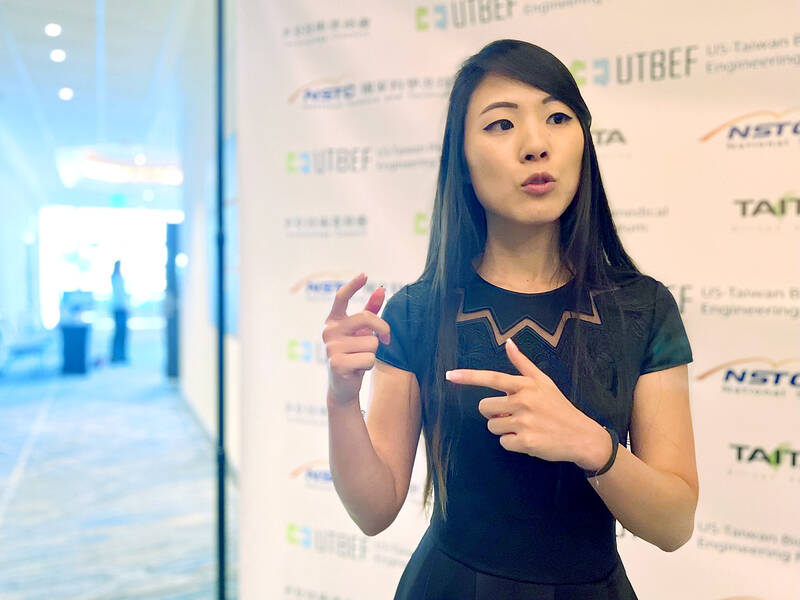A virtual model based on digital twin technology was the highlight of a biomedical engineering forum held jointly by the US and Taiwan in Santa Clara, California, on Tuesday.
With the use of artificial intelligence (AI)-based digital twin technology, doctors would be able to test the effectiveness of medications on a person’s digital twin before administering them, said Renee Yao (姚睿君), global healthcare AI start-ups lead at Nvidia Corp.
AI technology can also be adopted to determine which of the numerous cells in the human body are not functioning well, and thus can help physicians prescribe the right medicines, Yao said at the US-Taiwan Biomedical Engineering Forum (UTBEF).

Photo: CNA
The new technology also allows for faster development of new drugs, Yao said.
“In earlier years, it took at least 10 years to develop a new drug, and it cost about US$10 billion to bring it to market, but now the process takes only two months and costs about US$2 million,” she said.
The digitalization of genomic and organ data, as well as surgery, gives researchers and healthcare professionals access to a digital world in which they can simulate, validate and predict outcomes with greater accuracy, Yao said.
A digital twin is a virtual model that is designed using real-world data to accurately reflect a physical object, combining several core technologies such as AI, the Internet of Things, the cloud and extended reality, according to experts.
Nvidia has been at the forefront of efforts to adopt such technologies for use in the healthcare sector, providing support to more than 1,800 healthcare start-ups in the fields of digital health, medical instruments, medical imaging, genomics and drug discovery.
The US firm’s representative was among 17 other experts from the US and Taiwan who attended this year’s UTBEF physically or virtually to discuss ways to solve problems in the biomedical sector.
The Taiwanese attendees included former National Taiwan University Hospital superintendent Ho Hong-nerng (何弘能), Harvard Medical School assistant professor Yu Kun-hsing (余坤興) and Chen Huei-sheng (陳惠生), a doctor and faculty member at Indiana University School of Medicine.
UTBEF was launched in 2008 by Joseph Yang (楊啟航), former director of the Science and Technology Division at the Taipei Economic and Cultural Office in San Francisco. Since 2014, the Taiwanese American Industrial Technology Association Silicon Valley has hosted it.

MULTIFACETED: A task force has analyzed possible scenarios and created responses to assist domestic industries in dealing with US tariffs, the economics minister said The Executive Yuan is tomorrow to announce countermeasures to US President Donald Trump’s planned reciprocal tariffs, although the details of the plan would not be made public until Monday next week, Minister of Economic Affairs J.W. Kuo (郭智輝) said yesterday. The Cabinet established an economic and trade task force in November last year to deal with US trade and tariff related issues, Kuo told reporters outside the legislature in Taipei. The task force has been analyzing and evaluating all kinds of scenarios to identify suitable responses and determine how best to assist domestic industries in managing the effects of Trump’s tariffs, he

TIGHT-LIPPED: UMC said it had no merger plans at the moment, after Nikkei Asia reported that the firm and GlobalFoundries were considering restarting merger talks United Microelectronics Corp (UMC, 聯電), the world’s No. 4 contract chipmaker, yesterday launched a new US$5 billion 12-inch chip factory in Singapore as part of its latest effort to diversify its manufacturing footprint amid growing geopolitical risks. The new factory, adjacent to UMC’s existing Singapore fab in the Pasir Res Wafer Fab Park, is scheduled to enter volume production next year, utilizing mature 22-nanometer and 28-nanometer process technologies, UMC said in a statement. The company plans to invest US$5 billion during the first phase of the new fab, which would have an installed capacity of 30,000 12-inch wafers per month, it said. The

Taiwan’s official purchasing managers’ index (PMI) last month rose 0.2 percentage points to 54.2, in a second consecutive month of expansion, thanks to front-loading demand intended to avoid potential US tariff hikes, the Chung-Hua Institution for Economic Research (CIER, 中華經濟研究院) said yesterday. While short-term demand appeared robust, uncertainties rose due to US President Donald Trump’s unpredictable trade policy, CIER president Lien Hsien-ming (連賢明) told a news conference in Taipei. Taiwan’s economy this year would be characterized by high-level fluctuations and the volatility would be wilder than most expect, Lien said Demand for electronics, particularly semiconductors, continues to benefit from US technology giants’ effort

‘SWASTICAR’: Tesla CEO Elon Musk’s close association with Donald Trump has prompted opponents to brand him a ‘Nazi’ and resulted in a dramatic drop in sales Demonstrators descended on Tesla Inc dealerships across the US, and in Europe and Canada on Saturday to protest company chief Elon Musk, who has amassed extraordinary power as a top adviser to US President Donald Trump. Waving signs with messages such as “Musk is stealing our money” and “Reclaim our country,” the protests largely took place peacefully following fiery episodes of vandalism on Tesla vehicles, dealerships and other facilities in recent weeks that US officials have denounced as terrorism. Hundreds rallied on Saturday outside the Tesla dealership in Manhattan. Some blasted Musk, the world’s richest man, while others demanded the shuttering of his